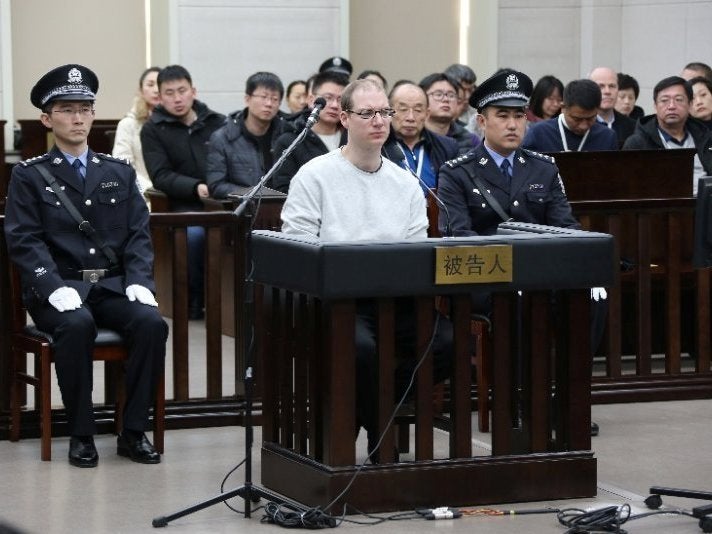Canada warns citizens over travelling to China after man suddenly handed death sentence
Foreign office advisory urges 'high degree of caution', highlighting 'arbitary' enforcement of laws and execution

Your support helps us to tell the story
From reproductive rights to climate change to Big Tech, The Independent is on the ground when the story is developing. Whether it's investigating the financials of Elon Musk's pro-Trump PAC or producing our latest documentary, 'The A Word', which shines a light on the American women fighting for reproductive rights, we know how important it is to parse out the facts from the messaging.
At such a critical moment in US history, we need reporters on the ground. Your donation allows us to keep sending journalists to speak to both sides of the story.
The Independent is trusted by Americans across the entire political spectrum. And unlike many other quality news outlets, we choose not to lock Americans out of our reporting and analysis with paywalls. We believe quality journalism should be available to everyone, paid for by those who can afford it.
Your support makes all the difference.Canada has issued a warning to its citizens about travelling to China after a Canadian man was sentenced to death on drug charges amid worsening diplomatic tensions.
The Canadian government told travellers to “exercise a high degree of caution” in the country, highlighting Chinese authorities’ “arbitrary enforcement” of local laws and the death penalty.
The foreign ministry issued the updated advisory hours after Robert Lloyd Schellenburg was sentenced to execution in a sudden retrial, two months after he was jailed for 15 years for drug smuggling.
An appeals court in the northeast province of Liaoning had ordered the retrial within weeks of Canada’s arrest of Meng Wanzhou, chief financial officer of the Chinese telecommunications giant Huawei.
The court ruled Schellenburg’s initial jail term was too lenient, but Canadian prime minister Justin Trudeau suggested Beijing was using its judicial system to apply pressure over the executive’s detention.
“It is of extreme concern to us as a government, as it should be to all our international friends and allies, that China has chosen to begin to arbitrarily apply a death penalty,” Mr Trudeau said.
Canada’s updated travel advisory noted that China’s “penalties for possession, use, production or trafficking of illegal drugs are strict and include the death penalty”.
“Penalties can be assigned arbitrarily,” it added.
Schellenburg, 36, was arrested more than four years ago and first went on trial in 2016. He was convicted of involvement in an international drug-trafficking operation that planned to smuggling 220kg of methamphetamine from a warehouse in the Chinese city of Dalian to Australia.
The Canadian’s lawyer, Zhang Dongshuo, said prosecutors had introduced no new evidence to justify a heavier sentence during Monday’s retrial, during which Schellenberg maintained his innocence. His client would appeal, he added.
Mr Zhang described the case as “unique” and said the one-day proceedings had been unusually swift, but he declined to comment on any connections to Ms Meng’s arrest.
Schellenberg’s aunt, Lauri Nelson-Jones, said her family’s worst fears had been realised.
“Our thoughts are with Robert at this time. It is rather unimaginable what he must be feeling and thinking,” she added. “It is a horrific, unfortunate, heartbreaking situation.”
China’s foreign ministry rejected criticism of the sentence, telling Mr Trudeau to respect the country's sovereignty.
The state-run Global Times newspaper dismissed suggestions that Beijing was attempting to pressure Canada over Ms Meng’s case, complaining of “unreasonable speculation” that showed “rude contempt” for Chinese law.
“Public opinion in Canada has claimed recently that China is ‘politicisng’ Schellenberg’s case, but what Canada is doing is actually politicising law,” said an editorial published on Monday.
Human Rights Watch accused China of “playing hostage politics”.
Executive director Kenneth Roth said Schellenberg’s rushed retrial and death penalty was a “fairly transparent” attempt to pressure Canada into releasing Ms Meng.
The executive, who is the daughter of Huawei’s founder, was arrested at Vancouver airport on 1 December at the request of the US.
American authorities have accused Ms Meng of using a subsidiary company to circumvent sanctions against Iran and have requested her extradition to face fraud charges.
Her arrest outraged China and has caused tensions between Beijing, the US and Canada.
Schellenberg is the third Canadian to run afoul of Chinese law since Ms Meng’s arrest. Former diplomat Michael Kovrig and business consultant Michael Spavor are both held on suspicion of endangering state security.
On Monday, China’s foreign ministry said authorities had determined Mr Kovrig was not entitled to diplomatic immunity, rejecting a complaint from Canada that Beijing was flouting longstanding protocols.
Join our commenting forum
Join thought-provoking conversations, follow other Independent readers and see their replies
Comments